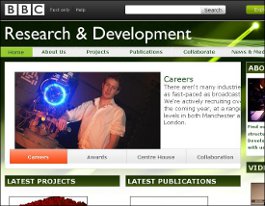First annual conference of the BBC Audio Research Partnership
Hi, my name is Frank Melchior and I’m head of audio research at BBC R&D. I’m also responsible for the BBC Audio Research Partnership and after one year of inspiring and fruitful collaboration I like to report about our first annual conference in MediaCityUK last September. Two days packed with keynotes, a poster session, brainstorming sessions, a panel discussion and flashlight presentations of the partners has given the opportunity to exchange ideas and develop new collaborations within this unique new way of working together. The BBC Audio Research Partnership was launched in 2011 and the video below will give an introduction to the idea of the partnership and the anniversary event.
In order to see this content you need to have both Javascript enabled and Flash Installed. Visit BBC Webwise for full instructions. If you're reading via RSS, you'll need to visit the blog to access this content.
After one year working together the partnership is developing towards international collaborations to gain the momentum required to move the audio industry forward. Three high profile keynotes contributed to the two inspiring days here at the BBC North. Alexander Raake from Telekom Innovation Labs, Berlin introduced in his keynote Thank you for the music, IP !? Quality of Experience of IP-based multimedia, the concept of quality of experience and current methods to assess it from an audience perspective. “ Quality of experience is the degree of delight or annoyance of the user of an application or service. It results from the fulfilment of his or her expectations with respect to the utility and / or enjoyment of the application or service in the light of the user’s personality and current state.” (Definition form Qualinet White Paper on Definitions of Quality of Experience (2012). European Network on Quality of Experience in Multimedia Systems and Services (COST Action IC 1003), Patrick Le Callet, Sebastian Möller and Andrew Perkis, eds., Lausanne, Switzerland, Version 1.1, June 3, 2012.)
Jürgen Herre from the International Audio Laboratories Erlangen and one of the key persons behind perceptual audio coding (e.g. MPEG 2 Layer 3 aka MP3) presented a fascinating journey through the world of MPEG audio entitled MPEG Audio - A Technology Motor for Broadcast Audio Delivery, The Motion Picture Expert Group (MPEG) is one of the important standardization bodies with strong activities in standardization of perceptual based audio coding. A new standard for 3D audio distribution is currently under discussion. This potential new standard will try to address some of the important challenges of future audio delivery like scalability, platform independence and new experience for the listener using 3D audio technology. 3D audio and its challenges was one of the important topics discussed during the event.
View Mark Plumbley from Queen Mary University London to learn more about some of the emerging trends which have been discussed during the event.
In order to see this content you need to have both Javascript enabled and Flash Installed. Visit BBC Webwise for full instructions. If you're reading via RSS, you'll need to visit the blog to access this content.
Joris de Man who is a freelance composer and sound designer presented the third keynote. His talk on The Art and Challenge of Interactive Game Music, introduced the fascinating topic of music for games and the creative challenges to make this music adaptive to the interactive nature of games. The game industry is an extreme innovative field for audio and therefore can be inspiring for the developments in broadcast audio of the future.
In order to discuss new research topics a poster session and a brainstorming session was held during the event. Two main challenges for the audio research as identified during the discussions are to create new experience for the audience and how to make audio content more accessible using methods of semantic audio. Creating new experience can be achieved by applying new reproduction methods and corresponding formats such as binaural reproduction as we used in the Festival of Nine lessons and Carols last year or by making audio content adaptive to the listener’s environment as in Perceptive media. In every case the aim is always to provide our creative colleagues new tools and technological options to deliver a story in the best possible way to our audience.
I’d like to thank my BBC colleagues who have worked hard to bring the conference together and all speakers and participants for these great two day on audio research. If you interested to read more about the audio research at BBC R&D visit our new website where you also will find information’s about current and future projects of the BBC Audio Research Partnership.


Comments Post your comment